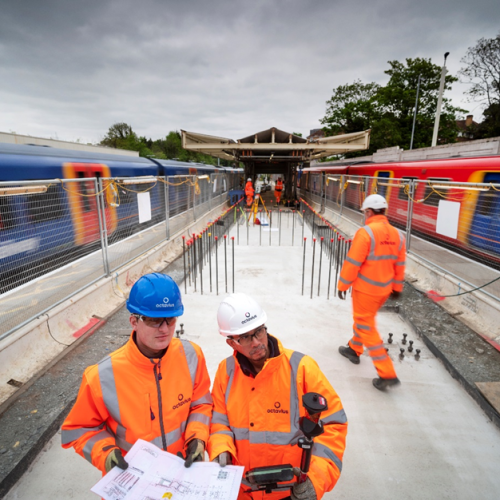The transition to Great British Railways, and a more integrated model, will be significant and essential – not just for the rail sector but for the entire nation, according to Octavius’s Rail Director, Matt Broxholme.
“This was implicit in the Williams-Shapps Review,” commented Matt. “It recognised that rail has a fundamental role to play in supporting economic, environmental, and social goals.
“Transport connectivity drives so much of what’s important in society. It supports economic growth, access to employment and quality of life. Thriving economies are ones where people, goods and services can move freely, efficiently and economically – and that’s where Great British Railways should take us. The rail network needs to be the backbone of the nation’s transport connectivity.”
Intelligent Working
Operationally, for a specialist infrastructure contractor like Octavius there should be significant advantages in combining track and infrastructure operations. It should lead to more intelligent working and fewer trade-offs between engineering works and access. How does Matt see project delivery evolving in this new environment?
“We’re already supporting Network Rail in its drive to provide minimum viable production (MVP) solutions. In simple terms this is the most pared-back proposition that will meet the specified outcomes of the customer.
“It’s important to understand that this isn’t just finding the lowest cost solution that meets the technical specification. The desired outcomes are always much broader. This is why MVP must start the project initiation stage when outcomes and requirements are defined. It will only be achieved if we question and challenge culture, process and engineering judgements, particularly in the early phases of a project.”
The most fundamental success criteria for Great British Railways will be attracting more passengers onto trains, not at the expense of other public transport options but instead of using private cars or short-haul flights.
“This obviously means having affordable fares but also ensuring that the overall experience for rail users is a positive one. As a rail supplier we have to ensure the work we undertake truly considers the impact on passengers, freight, and on neighbours and the public – we always have to be a good corporate citizen,” said Matt.
Project Speed
The Network Rail-led Project Speed sets the scene for what’s to come in terms of driving efficiencies and productivity. It was jointly developed by the DfT and Network Rail in summer 2020.
Infrastructure projects at different stages of development have been reviewed to identify how government funding could go further and work could be carried out faster.
“We’re working with Network Rail on a number of Project Speed schemes, to increase resilience and capacity which is MVP in action. On one project, we’re targeting minimal additional infrastructure with a phased introduction of services. Existing freight capability must be maintained on the line and the new railway service must not be at the expense of existing bus services. The aim is for a modal shift to encourage people out of their cars,” said Matt.
“This is the type of approach that will build capacity cost-effectively and help the UK as a whole move towards a net zero carbon future.”
Summing up the significance of creating Great British Railways Matt ends with this thought:
“Creating a new organisation to oversee and operate the rail network won’t solve all of the problems on its own. But Great British Railways is a huge step forward in creating the environment in which a rejuvenated rail network powers economic growth and a better quality of life for all.”
To learn more visit our transport infrastructure resource centre or contact Mike Todd (mike.todd@octaviusinfrastructure.co.uk).


